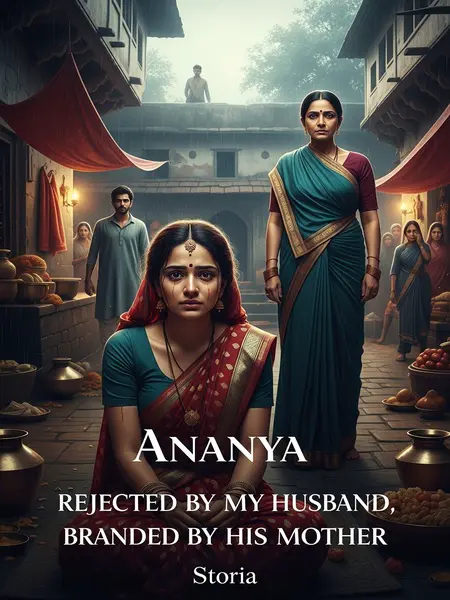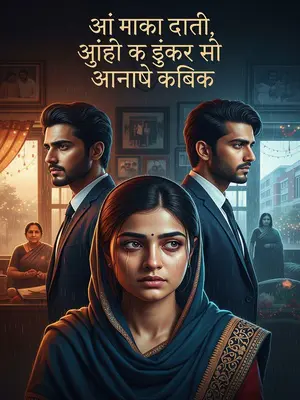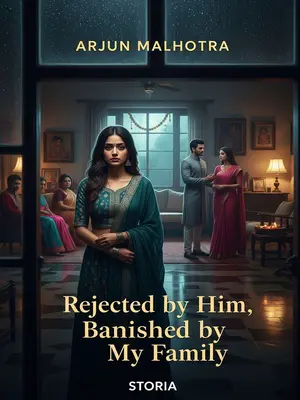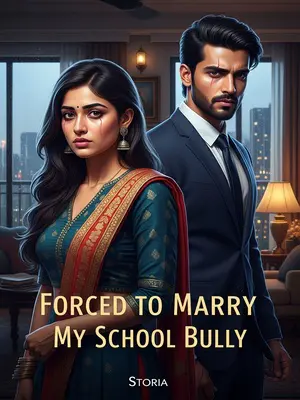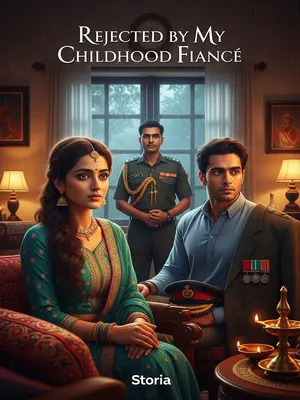Chapter 3: The Accusation
She wore a dark blue long kurta, her figure thin, her face pale.
The fabric clung to her, soaked in sweat and rain. Strands of hair escaped her bun, sticking to her temples. There was an air of urgency about her, as if she had battled both the weather and her own doubts to reach us.
In the chilly weather, sweat beaded her brow.
People whispered, wondering what could make her rush out like this. The chill in the air did nothing to cool her temper—her hands shook, but her voice was steady as ever.
It looked like she had run all the way here.
Her slippers were muddy, the hem of her kurta splattered with dirt. Even the neighbours stared, surprised at her determination.
“This, this marriage—I, I do not agree!”
She stammered slightly, but her meaning was clear. Everyone fell silent, waiting for her next words.
Mother-in-law braced herself against the door, clutching her chest with one hand.
For a moment, I thought she might collapse. But she steadied herself, eyes never leaving the faces in front of her. She was ready for battle.
She was still out of breath, but couldn’t wait to break off the engagement in public:
She straightened, raising her voice so even those at the back could hear. No one could doubt her intent.
“I do not agree to Radha marrying my son. This marriage is over!”
The words hung in the air, heavy and final. A collective gasp rippled through the crowd.
My mother, known in the village for her gentle nature, couldn’t help but darken her face.
I’d never seen Amma so angry. Her eyes flashed, mouth set in a hard line—she looked ready to throw her chappal at anyone who crossed her.
“Kamala Sharma, what do you mean by this?”
Her voice, usually soft and soothing, now rang out, strong as a temple bell. The neighbours glanced at each other, nervous.
Uncle Sharma frowned as well.
He stepped forward, arms crossed, jaw clenched. "Yeh koi tareeka hai, Bhabhi? Log kya kahenge?" he muttered, his voice more natural, the crowd nodding in agreement.
“Bhabhi, breaking off an engagement isn’t a joke.”
His tone was firm but pleading, as if hoping she would see reason. The crowd nodded along—everyone knew the weight such words carried.
“You have to make yourself clear.”
People edged closer, eager to hear her explanation. Children clung to their mothers’ saris, sensing the tension.
“Don’t end up making enemies instead of in-laws.”
A few older women exchanged meaningful glances, whispering about the importance of keeping peace in the village.
Our house was at the head of the village, the Sharma’s at the end.
The distance between our homes felt like a chasm today. Everyone understood the implications—alliances broken here could set the tone for years to come.
Everyone in the village knew the Sharma family was coming today to deliver shagun.
Even the shopkeepers had closed early to watch the spectacle. It was the day’s biggest news—who would have imagined such drama?
Her running all the way here had already drawn a crowd.
By the time she reached our gate, half the village had gathered. The street was packed with people, their voices a low hum of speculation.
Now, the onlookers were packed at the entrance, blocking the courtyard gate.
People pressed forward, eager for a closer look. The matchmaker tried in vain to restore order, waving her hands and shushing the children.
The matchmaker hurried forward, grabbing my mother-in-law’s hand and winking desperately at her.
She leaned in, voice barely above a whisper. “Aunty, abhi mat bolo kuch bhi. Let’s talk inside, na?” But my mother-in-law refused to budge.
“Aunty Sharma, what are you doing?”
The matchmaker’s tone grew more urgent. “Think about the families, the children’s future!”
“We’ve already completed all the rituals: proposal, exchanging names, choosing an auspicious date.”
She rattled off the list of ceremonies, hoping to shame her into reconsidering. “What will people say if you break it off now?”
“The two children’s birth dates have been matched, and Pandit Ram from the west of town said Ananya is a lucky girl who brings prosperity to her husband.”
Pandit Ram’s words carried weight—everyone knew he was never wrong about these things. The crowd murmured in agreement.
“Such a good girl—pretty and hardworking—what more could you want?”
The matchmaker’s voice cracked as she pleaded. “You won’t find a better match for Rohan, I’m telling you.”
“According to village rules, if the boy’s side breaks off the engagement, the girl’s family doesn’t have to return the shagun.”
People nodded, recalling past cases. Rules were rules, and breaking them meant losing face and money.
She glanced quickly at the two loads of gifts in the courtyard.
Her eyes flicked from the boxes of sweets to the shiny utensils, calculating the loss. “It’s not a small amount, Aunty.”
“These gifts cost you fifteen thousand rupees.”
Fifteen thousand! That was enough to buy a buffalo, or pay for a year of tuition. The sum hung in the air like a threat.
At this, my mother-in-law’s eyes darkened.
Her lips curled, and she shot a look that could curdle milk. The crowd braced itself for the next blow.
She rolled her eyes, her gaze sweeping over my parents before landing on me.
Her stare lingered, cold and calculating. I felt the old sting of her disapproval, sharp as ever.
When she saw me, her eyes flickered, a flash of disgust crossing her face.
It was the same look she gave me whenever I dropped a glass or made a mistake—a look that said I was unworthy.
That look—I had seen it all my life, and it was all too familiar.
My heart clenched, old wounds opening up. Nothing had changed—not in this life, not in the last.
Mother-in-law—she had been reborn, too.
A chill ran down my spine. Was it possible? Did she remember everything, just like I did?
She slowly straightened, staring at me maliciously, sneering again and again.
Her mouth twisted in a cruel smile, as if she took pleasure in my suffering. The neighbours watched, eyes wide with curiosity and fear.
“Of course the shagun must be returned to the Sharma family.”
Her voice was icy, cutting through the murmurs. She would not back down, not today.
“The Singh family not only has to return the gifts, but also compensate us twenty thousand rupees.”
The crowd gasped—twenty thousand! People exchanged shocked glances. No one had expected her to go this far.
“Because Ananya, that shameless girl, is no longer a virgin!”
A gust of wind rattled the gate. Someone’s chai glass slipped and hit the ground, but no one moved to pick it up. The accusation dropped like a bomb. Women clapped their hands to their mouths, men muttered angrily. The courtyard buzzed with outrage.
The courtyard exploded.
Angry voices rose in a chorus—some shouting in defence, others fanning the flames. The air was thick with dust and indignation.
My mother’s eyes turned red with fury, as if she might tear someone apart.
Her hands shook, but she stood tall. For the first time, I saw a side of her that was pure steel.
“Nonsense! Kamala Sharma, I’ll rip that filthy mouth of yours!”
Amma lunged forward, her voice trembling with rage. The women around her held her back, afraid of what she might do.
My fifteen-year-old younger brother leapt up like a wildcat, fists raised at my mother-in-law.
His voice cracked mid-shout, but he stood in front of me, fists balled like a child ready to fight the world. He was usually shy, but today his face was flushed, eyes blazing. “Don’t you dare speak about my sister that way!”
“How dare you slander my sister! I’ll beat you to death, you old hag!”
He spat the words, shaking with anger. The crowd cheered him on, some even urging him forward.
Father grabbed him by the waist, veins bulging on his forehead.
Baba’s grip was iron, his face drawn and tired. But there was pride in his eyes, too—pride for his son’s courage.
After a deep breath, he turned to Uncle Sharma.
He tried to restore order, his voice calm but firm. “Let’s settle this peacefully,” he said, though his hands shook with barely contained rage.
“Uncle, this needs to be made clear.”
He pointed at my mother-in-law, demanding an explanation. “We won’t accept false accusations.”
“Otherwise, the Singh family won’t take this lying down!”
His words echoed across the courtyard, met with murmurs of agreement. No one wanted to see a blood feud begin.
A chorus of agreement rose up.
Relatives and neighbours alike took our side. The women of my family, their chunnis flying, rallied around Amma, ready to defend our honour.
We live in Gulmohar Village, a large village of three or four hundred households—half surnamed Singh, half surnamed Sharma.
The two clans had lived side by side for generations, sharing both joys and sorrows. But today, a line was being drawn in the sand.
Everyone is related somehow.
Cousins, in-laws, distant uncles—no one was truly an outsider here. Every word spoken would be remembered for years.
Several of my buas stood with hands on their hips, spitting as they spoke, wishing they could help my mother tear my mother-in-law’s mouth apart.
“Aree, Kamala Sharma, you’ve lost your mind!” one shouted. Another waved her sandal, threatening to throw it. The scene bordered on chaos.
“Kamala Sharma, what kind of rubbish are you talking?”
Their voices rose above the din, sharp as chilies in hot oil.
“Our Ananya is a well-known good girl, never even talks with the village boys!”
My aunts glared at anyone who dared suggest otherwise. Their loyalty made me want to cry.
“Do you think the Singh family is short of people? How dare you slander our daughter’s name!”
The men joined in, their voices a steady rumble. It was clear—today, the Singhs would not be cowed.
